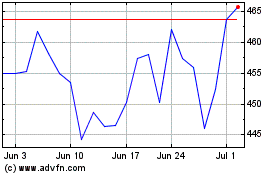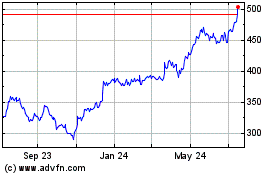By Liz Hoffman and Serena Ng
In a strange reverberation of the housing crisis, Goldman Sachs
Group Inc. has become a voracious buyer of soured mortgages, trying
to make money even as it looks to fulfill terms of a government
settlement that calls for it to help struggling homeowners.
Over the past year-and-a-half, the Wall Street giant has become
the largest buyer of severely delinquent home loans from mortgage
giant Fannie Mae. The firm has acquired nearly two-thirds of $9.6
billion in loans the agency has auctioned, representing unpaid loan
balances of $5.7 billion, a Wall Street Journal review of
government records shows.
Goldman's buying spree has been sparked by a $5.1 billion
settlement the firm entered into last year with federal and state
governments over its role in packaging and selling mortgage-backed
securities in the housing meltdown. As part of this, the firm
agreed to provide $1.8 billion in homeowner relief.
The way it works: Goldman fixes up loans by helping borrowers
get current, gets credit for doing so from regulators and hopes to
sell the debt -- when people are paying consistently again -- at a
profit.
But Goldman faced a unique problem. Unlike other big banks that
have entered into similar agreements, such as J.P. Morgan Chase
& Co. or Bank of America Corp., Goldman wasn't a big originator
of home loans.
Rather, in the run-up to the housing crisis, it bought billions
of dollars in mortgages and bundled them into bonds it sold to
investors. It later made large bets against those same bonds and
profited when the housing meltdown hit.
So Goldman lacked an inventory of mortgages to modify for its
settlement. That has spurred it to buy troubled loans, according to
people familiar with its purchases.
On Tuesday Goldman won the majority of loans at Fannie's latest
auction, its largest to date. The bank bought about 8,000 loans
with unpaid balances of $1.4 billion.
Under its settlement, Goldman can fulfill its relief obligation
by forgiving loan balances for struggling homeowners or reducing
monthly payments. The part of the loan that is modified counts
toward the settlement.
The relief Goldman agreed to provide reduced the amount of cash
Goldman had to pay directly to the government as part of the
overall settlement. And the modifications can prove less costly to
the firm over time.
After borrowers resume monthly payments, the bank hopes to sell
the loans at a profit, the people said. In some cases, though,
Goldman is quickly recouping money by foreclosing on homes and
selling them, government records show.
"They are back in business," Chris Wyatt, a former executive at
a Goldman-owned mortgage servicing business, said of the bank's
loan-buying. Today an adviser to homeowners facing foreclosure, Mr.
Wyatt has researched loan sales. Goldman's "appetite has gone up
dramatically," he said.
In all, Goldman has spent roughly $4.5 billion on some 26,000
Fannie-owned loans, according to the government records. It has
also been buying mortgages, in smaller size, from private sellers
and Freddie Mac, Fannie's sibling, according to county records,
government filings and traders.
In 2015, Fannie and Freddie began auctioning off delinquent, or
"nonperforming," mortgages in batches. Most had been written in the
years leading up to the crisis, when home values soared and lending
standards slipped. Some had gone unpaid for as long as six years,
according to public documents on the loans.
Selling the loans, often at a significant discount to their face
value, has helped Fannie and Freddie recoup some losses while
leaving the tedious task of restructuring the loans to others.
Because Goldman is getting credit toward fulfilling the terms of
its settlement, it can afford to pay more, according to people
familiar with the process. Its aggressive bidding has raised
eyebrows among competitors and was much talked about on the
sidelines of a recent securitization-industry conference in Las
Vegas, according to attendees.
Goldman has paid between 50 and 90 cents on the dollar for the
loans, according to Fannie Mae records. A steady rise in home
prices has increased the cost of buying delinquent loans in recent
years -- but also the potential profit if Goldman can resell them
or foreclose on the property.
The bank has made most of its purchases through a subsidiary
called MTGLQ Investors LP, government records show. Shorthand for
"mortgage liquidation" and nominally based at a suburban Dallas
office park, MTGLQ has been used by Goldman since the early 1990s
to trade credit.
Goldman is buying the delinquent loans with an eye toward
restructuring them by reducing interest rates, lengthening the term
of the loan, or forgiving some of the debt outright, according to
people familiar with the purchases.
The bank's immediate goal is to get credit for the settlement,
though the longer-term goal is to make money over time, the people
said. That can happen by the firm collecting mortgage payments if
it gets borrowers back on track, or by selling the loans once the
borrowers are up-to-date again.
That loan workout process can take one to two years, and buyers
can make between five and 15 cents on the dollar above what they
originally paid, said Sandeep Bordia, head of research at Amherst
Capital Management LLC, a $7 billion investment firm that buys
soured mortgages. Loans that are up-to-date on payments fetch far
higher prices than those that are behind, he said.
"Buying nonperforming loans and modifying them is a profitable
business, " said Laurie Goodman, co-director of the Housing Finance
Policy Center at Urban Institute, a Washington, D.C.-based think
tank.
Goldman has given few homeowners a break and has foreclosed on
many of the loans it has acquired, property and court records show.
Because Goldman is purchasing loans in bulk, some aren't suitable
for modification. The firm looks to foreclose those, according to
people familiar with the purchases.
Last year, the bank modified 100 home loans in a pilot program
to test its selection and modification process, according to Eric
Green, an independent monitor appointed to oversee Goldman's
government-mortgage settlement. It sought $2 million in credit
toward its settlement.
The bank expects to ramp up modifications as it works through
more recent Fannie Mae loans, whose borrowers are on better
financial footing, a person familiar with the matter said.
Write to Liz Hoffman at liz.hoffman@wsj.com and Serena Ng at
serena.ng@wsj.com
(END) Dow Jones Newswires
March 16, 2017 19:40 ET (23:40 GMT)
Copyright (c) 2017 Dow Jones & Company, Inc.
Goldman Sachs (NYSE:GS)
Historical Stock Chart
From Mar 2024 to Apr 2024

Goldman Sachs (NYSE:GS)
Historical Stock Chart
From Apr 2023 to Apr 2024
